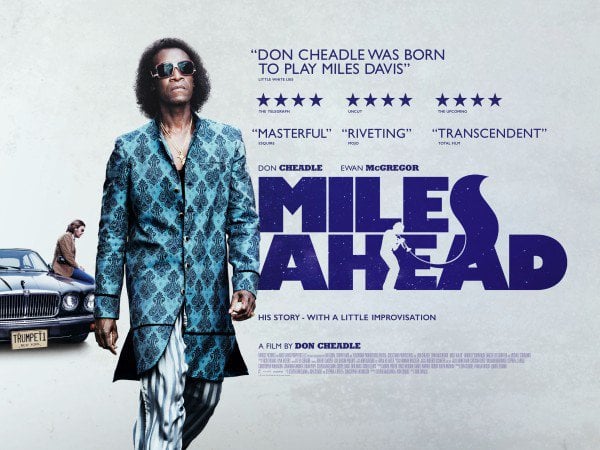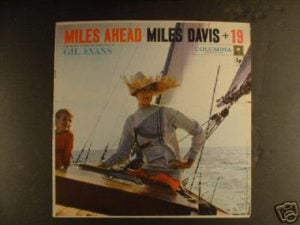Review: Miles Ahead directed by Don Cheadle
April 28, 2016

The music biopic is a staple, but it rarely succeeds in capturing the essence of its subject, content to luxuriate on the surface and paint hagiographic, award-friendly portraits of the meteoric rise, humbling fall and redemptive coda. Recently, we’ve had Jimi: All Is by My Side (2013), an achingly drab portrait of Jimi Hendrix; Get on Up (2014), a flabby, meandering account of James Brown’s fabled rages-to-riches arc; the entertaining but overly affectionate study of gangster rap pioneers N.W.A., Straight Outta Compton (2015); and the fittingly wistful take on the life of Brian Wilson, Love and Mercy (2014). Coming up, we have the controversial Nina (2016), which has been branded a ‘racist disaster’ for the decision to cast Zoe Saldana as Nina Simone, wearing make-up to darken her skin; the Chet Baker biopic Born to be Blue (2015), for which Ethan Hawke has been garnering raves; and Tom Hiddleston taking on country legend Hank Williams in I Saw the Light (2015).
Compelled as much by the vicissitudes of film financing as a radical impulse, Don Cheadle – the co-writer/director/producer/star of Miles Ahead – threw out the music biopic’s well-worn formula in favour of a heady, impressionistic ‘meditation on a person’. Miles Ahead manages to encompass the major phases in Davis’s artistic evolution – the birth of bebop, the years of collaboration with arranger Gil Evans which produced such masterpieces as Kind of Blue (1959) and Sketches of Spain (1960), and the fusion years of Bitches Brew (1970) – without offering a staid greatest hits package. Those expecting a biographical crib sheet will be disappointed, but Miles Ahead captures Davis in all his tempestuous, abrasive, grandiose, self-sabotaging glory. One word that certainly doesn’t describe Miles Ahead is reverential.
 Miles Ahead is set in the early ’80s during a creatively fallow period for Davis; he hasn’t released any new material for five years and leads a reclusive existence in his New York brownstone. He has become ‘the Howard Hughes of Jazz’; mourning the departure of his wife and muse, Frances Taylor (Emayatzy Corinealdi), taking prodigious amounts of cocaine and drinking heavily. The perception is that Davis is washed up, that his work with Evans represented ‘the mountaintop’ for him and the artform he helped to revolutionize. He refuses to hand over the master tapes for his comeback album to his label, Columbia Records. Davis’s solitude is disrupted when he is doorstepped by Dave Braden (Ewan McGregor), a journalist for Rolling Stone magazine who tells Davis he has been sent by Columbia to interview him in preparation for his big comeback. Needless to say, Davis doesn’t respond well to this intrusion, but Braden’s presence rouses Davis from his self-imposed exile.
Miles Ahead is set in the early ’80s during a creatively fallow period for Davis; he hasn’t released any new material for five years and leads a reclusive existence in his New York brownstone. He has become ‘the Howard Hughes of Jazz’; mourning the departure of his wife and muse, Frances Taylor (Emayatzy Corinealdi), taking prodigious amounts of cocaine and drinking heavily. The perception is that Davis is washed up, that his work with Evans represented ‘the mountaintop’ for him and the artform he helped to revolutionize. He refuses to hand over the master tapes for his comeback album to his label, Columbia Records. Davis’s solitude is disrupted when he is doorstepped by Dave Braden (Ewan McGregor), a journalist for Rolling Stone magazine who tells Davis he has been sent by Columbia to interview him in preparation for his big comeback. Needless to say, Davis doesn’t respond well to this intrusion, but Braden’s presence rouses Davis from his self-imposed exile.
Cheadle struggled for eight years to bring this story to the screen – he has a long history of using his status to push through challenging material like Hotel Rwanda (2004), for which he earned an Oscar nomination. By Cheadle’s own admission, Miles Ahead was a hard sell: a period film from a first-time director about Jazz featuring a predominantly black cast. Cheadle deferred his own fee and turned to crowdsourcing after coming up against some of the entrenched opinion that exists within the industry – but more on that later.
 Cheadle has made a virtue of adversity, proving himself a worthy graduate of the Soderbergh run-and-gun school and fashioning a stylistically daring work which holds true to Davis’s maxim: ‘be wrong strong’. Cheadle and Steven Baigelman’s screenplay forsakes the rigidly linear cradle-to-grave biopic model in favour of a fractured timescale which seeks to replicate the motions of memory, creating the sensation of traversing an internal space, walking the corridors and visiting the rooms in which character insight truly resides. Yes, there are some strange narrative choice; in particular the distinctly Blaxploitation subplot, which should have the effect of wrenching the viewer from the story, but somehow seems entirely in keeping with a world in which the border between fantasy and reality is decidedly porous.
Cheadle has made a virtue of adversity, proving himself a worthy graduate of the Soderbergh run-and-gun school and fashioning a stylistically daring work which holds true to Davis’s maxim: ‘be wrong strong’. Cheadle and Steven Baigelman’s screenplay forsakes the rigidly linear cradle-to-grave biopic model in favour of a fractured timescale which seeks to replicate the motions of memory, creating the sensation of traversing an internal space, walking the corridors and visiting the rooms in which character insight truly resides. Yes, there are some strange narrative choice; in particular the distinctly Blaxploitation subplot, which should have the effect of wrenching the viewer from the story, but somehow seems entirely in keeping with a world in which the border between fantasy and reality is decidedly porous.
Cheadle is the film’s fulcrum; he immersed himself in Davis’s world and learned the trumpet for the role. Like his rendering of Sammy Davis Jr. in The Rat Pack (1998), Cheadle’s interpretation of Miles carries an emotional truth rather than merely offering up a passable impersonation. Cheadle captures Davis’s raspy locutions and on-stage swagger, but also keys into the vulnerabilities that fuelled his art, the mental armour that protected the creative core. The Davis we see is a man who is hemmed in by his legacy but constantly striving to redefine himself, and Cheadle assays this yearning with tremendous empathy and insight.
McGregor’s presence in the film is controversial – pressure was put to bear on the producers by nervous financiers who were concerned that the film was ‘too black’ to find an overseas audience. McGregor was cast and his role expanded to allay any such fears. Cheadle graciously referred to this concession as ‘international casting’. McGregor’s Braden serves chiefly as a comic foil, following the whims of his journalistic quarry and stumbling into a series of increasingly outlandish predicaments. Corinealdi is a radiant presence, and she delivers a performance of genuine substance as the love of Davis’s life; while Michael Stuhlbarg, one of the most versatile character actors currently working, clearly revels the opportunity to play the nasty and conniving entertainment agent, Harper Hamilton.
Miles Ahead is not an overtly political work, but the process of making the film has clearly informed its approach to the issue of race, working within a cultural milieu while speaking to today’s anxieties without succumbing to the twin perils of self-importance and didacticism. So many passion projects are an exercise in vanity, but Miles Ahead is neither a panegyric or an ego trip. Cheadle makes no attempt to smooth the sharp edges; Miles Ahead doesn’t fall into the trap of wanting you to like its protagonist, but locks into the tempos and rhythms, the intensity and motion of this brilliant but uncompromising man. Like Davis himself, Miles Ahead is occasionally unfocused but never predictable. Cheadle heeds Davis’s injunction to ‘come with some attitude’ and creates a work of boldness, vibrancy and invention.
Follow Daniel Palmer on Twitter at @mrdmpalmer
Filed under: Film, TV & Tech
Tagged with: Don Cheadle, Emayatzy Corinealdi, Ewan McGregor, film, jazz, Miles Davis



Comments